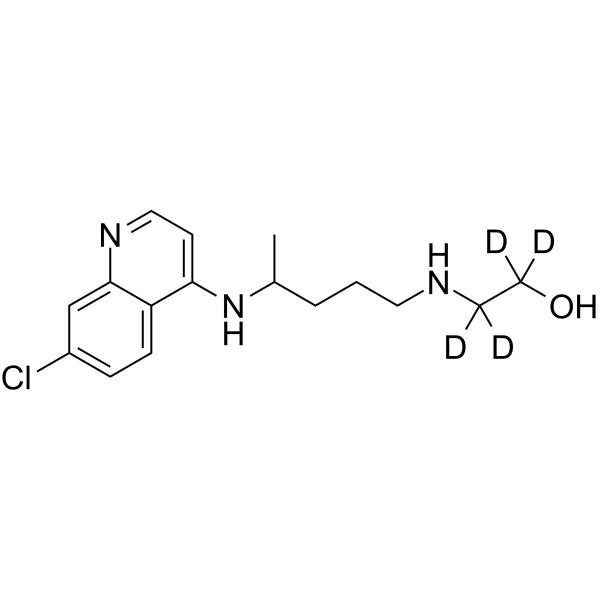1854126-47-8
| Name | Desethyl Hydroxychloroquine-d4 |
|---|---|
| Synonyms |
Desethyl Hydroxychloroquine-d4
2-({4-[(7-Chloro-4-quinolinyl)amino]pentyl}amino)(2H4)ethanol |
| Description | Cletoquine-d4 is deuterium labeled Cletoquine. Cletoquine (Desethylhydroxychloroquine) is a major active metabolite of Hydroxychloroquine. Cletoquine is produced in the liver by CYP2D6, CYP3A4, CYP3A5, and CYP2C8 isoenzymes. Cletoquine is also a Chloroquine derivative and has the ability to against the chikungunya virus (CHIKV). Cletoquine has antimalarial effects and has the potential for autoimmune diseases treatment[1][2]. |
|---|---|
| Related Catalog | |
| In Vitro | Stable heavy isotopes of hydrogen, carbon, and other elements have been incorporated into drug molecules, largely as tracers for quantitation during the drug development process. Deuteration has gained attention because of its potential to affect the pharmacokinetic and metabolic profiles of drugs[1]. |
| References |
| Density | 1.2±0.1 g/cm3 |
|---|---|
| Boiling Point | 514.7±50.0 °C at 760 mmHg |
| Molecular Formula | C16H18D4ClN3O |
| Molecular Weight | 311.84 |
| Flash Point | 265.1±30.1 °C |
| Exact Mass | 311.170258 |
| LogP | 2.60 |
| Vapour Pressure | 0.0±1.4 mmHg at 25°C |
| Index of Refraction | 1.623 |
